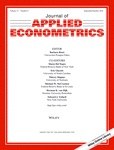
Hochguertel, S. and Ohlsson, H. (2009). Compensatory inter vivos gifts Journal of Applied Econometrics, 24:993--1023.
-
Affiliated authorStefan Hochguertel
-
Publication year2009
-
JournalJournal of Applied Econometrics
Parents' transfer motives are important for understanding, e.g., macroeconomics, income (re)distribution, savings, and public finance. Using data from six biennial waves of the Health and Retirement Study 1992-2002, we estimate censored regression models with nested multilevel error components. First, we interpret our findings that inter vivos transfers from parents to children are gifts, rather than temporary help to overcome liquidity constraints. Second, inter vivos gifts are compensatory in the sense that lifetime poorer children will receive higher transfers than their lifetime richer siblings. Third, inter vivos gifts do not, however, make up the entire difference in lifetime incomes. {\textcopyright} 2009 John Wiley \& Sons, Ltd.